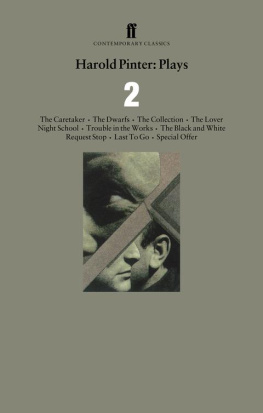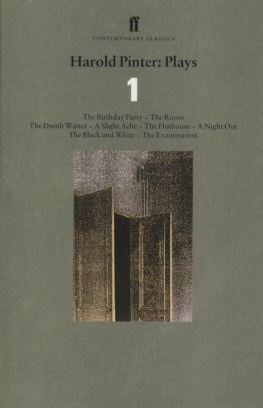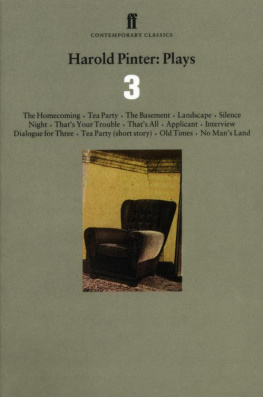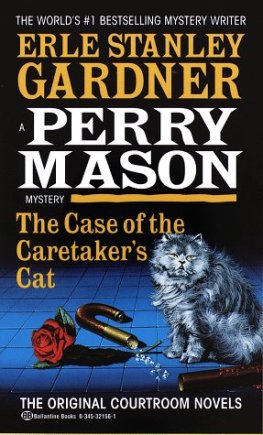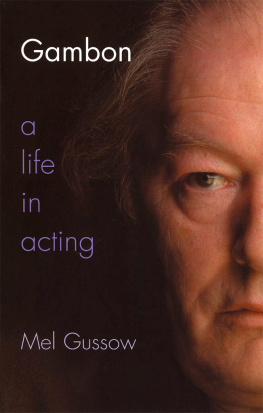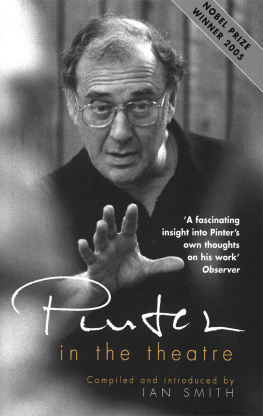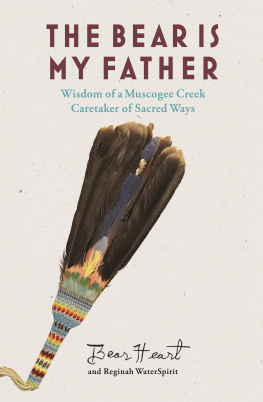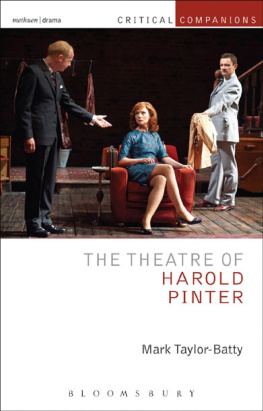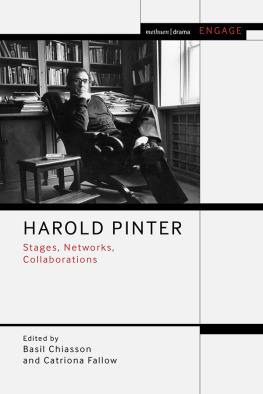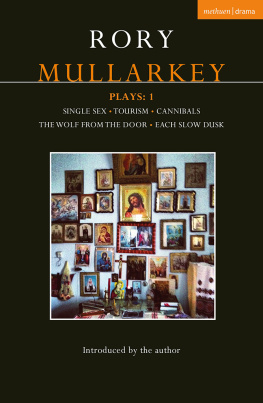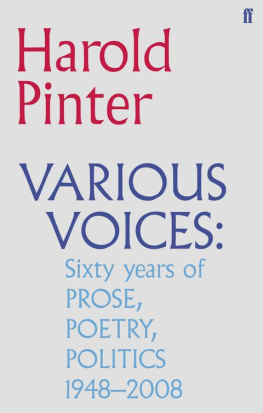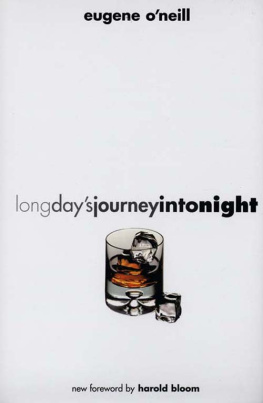Writing for Myself
BasedonaconversationwithRichardFindlaterpublishedin The Twentieth Century,
February1961. The first time I went to a theatre, as far as I remember, was to see Donald Wolfit in Shakespeare. I saw his Lear six times, and later acted with him in it, as one of the kings knights. I saw very few plays, in fact, before I was twenty. Then I acted in too many. I did eighteen months in Ireland with Anew McMaster, playing one-night stands in fit-ups, and Ive worked all over the place in reps Huddersfield, Torquay, Bournemouth, Whitby, Colchester, Birmingham, Chesterfield, Worthing, Palmers Green and Richmond.
I was an actor for about nine years (under the name of David Baron) and I would like to do more. I played Goldberg in TheBirthdayParty at Cheltenham recently, and enjoyed it very much. Id like to play that part again. Yes, my experience as an actor has influenced my plays it must have though its impossible for me to put my finger on it exactly. I think I certainly developed some feeling for construction which, believe it or not, is important to me, and for speakable dialogue. I had a pretty good notion in my earlier plays of what would shut an audience up; not so much what would make them laugh; that I had no ideas about.
Whenever I write for the stage I merely see the stage Ive been used to. I have worked for theatre in the round and enjoyed it, but it doesnt move me to write plays with that method in mind. I always think of the normal picture-frame stage which I used as an actor. All the time I was acting I was writing. Not plays. Hundreds of poems about a dozen are worth republishing and short prose pieces.
A lot of these were in dialogue, and one was a monologue which I later turned into a revue sketch. I also wrote a novel. It was autobiographical, to a certain extent, based on part of my youth in Hackney. I wasnt the central character, though I appeared in it in disguise. The trouble about the novel was that it was stretched out over too long a period, and it incorporated too many styles, so that it became rather a hotch-potch. But Ive employed certain strains in the book which I thought were worth exploring in my radio play TheDwarfs. That was the title of the novel.
I didnt start writing plays until 1957. I went into a room one day and saw a couple of people in it. This stuck with me for some time afterwards, and I felt that the only way I could give it expression and get it off my mind was dramatically. I started off with this picture of the two people and let them carry on from there. It wasnt a deliberate switch from one kind of writing to another. It was quite a natural movement.
A friend of mine, Henry Woolf, produced the result TheRoom at Bristol University, and a few months later in January 1958 it was included in a different production in the festival of university drama. Michael Codron heard about this play and wrote to me at once to ask if I had a full-length play. I had just finished TheBirthdayParty I start off with people, who come into a particular situation. I certainly dont write from any kind of abstract idea. And I wouldnt know a symbol if I saw one. I dont see that theres anything very strange about TheCaretaker, for instance, and I cant quite understand why so many people regard it in the way they do.
It seems to me a very straightforward and simple play. The germ of my plays? Ill be as accurate as I can about that. I went into a room and saw one person standing up and one person sitting down, and a few weeks later I wrote TheRoom. I went into another room and saw two people sitting down, and a few years later I wrote TheBirthdayParty. I looked through a door into a third room, and saw two people standing up and I wrote TheCaretaker. I dont write with any audience in mind. I just write. I take a chance on the audience. Thats what I did originally, and I think its worked in the sense that I find there is an audience.
If youve got something you want to say to the world, then youd be worried that only a few thousand people might see your play. Therefore youd do something else. Youd become a religious teacher, or a politician perhaps. But if you dont want to give some particular message to the world, explicitly and directly, you just carry on writing, and youre quite content. I was always surprised that anyone initially came in to see my plays at all, because writing them was a very personal thing. I did it and still do it for my own benefit; and its pure accident if anyone else happens to participate.
Firstly and finally, and all along the line, you write because theres something you want to write, have to write. For yourself. Im convinced that what happens in my plays could happen anywhere, at any time, in any place, although the events may seem unfamiliar at first glance. If you press me for a definition, Id say that what goes on in my plays is realistic, but what Im doing is not realism. Writing for television? I dont make any distinction between kinds of writing, but when I write for the stage I always keep a continuity of action. Television lends itself to quick cutting from scene to scene, and nowadays I see it more and more in terms of pictures.
When I think of someone knocking at a door, I see the door opening in close-up and a long shot of someone going up the stairs. Of course the words go with the pictures, but on television, ultimately, the words are of less importance than they are on the stage. A play I wrote called ANightOut did, I think, successfully integrate the picture and the words, although that may be because I wrote it first for radio. Sixteen million people saw that on television. Thats very difficult to grasp. You cant even think about it.
And when you write for television, you dont think about it. I dont find television confining or restrictive, and it isnt limited to realism, necessarily. Its possibilities go well beyond that. I have one or two ideas in my mind at the moment which wouldnt be very realistic and which might be quite effective on television. I like writing for sound radio, because of the freedom. When I wrote TheDwarfs a few months ago, I was able to experiment in form a mobile, flexible structure, more flexible and mobile than in any other medium.
And from the point of view of content I was able to go the whole hog and enjoy myself by exploring to a degree which wouldnt be acceptable in any other medium. Im sure the result may have been completely incomprehensible to the audience, but it isnt as far as Im concerned, and it was extremely valuable to me. No, Im not committed as a writer, in the usual sense of the term, either religiously or politically. And Im not conscious of any particular social function. I write because I want to write. I dont see any placards on myself, and I dont carry any banners.
Ultimately I distrust definitive labels. As far as the state of the theatre is concerned, Im as conscious as anyone else of the flaws of procedure, of taste, of the general set-up in management, and I think things will go on more or less as they are for some considerable time. But it seems to me that there has been a certain development in one channel or another in the past three years. TheCaretaker wouldnt have been put on, and certainly wouldnt have run, before 1957. The old categories of comedy and tragedy and farce are irrelevant, and the fact that managers seem to have realized that is one favourable change. But writing for the stage is the most difficult thing of all, whatever the system.

